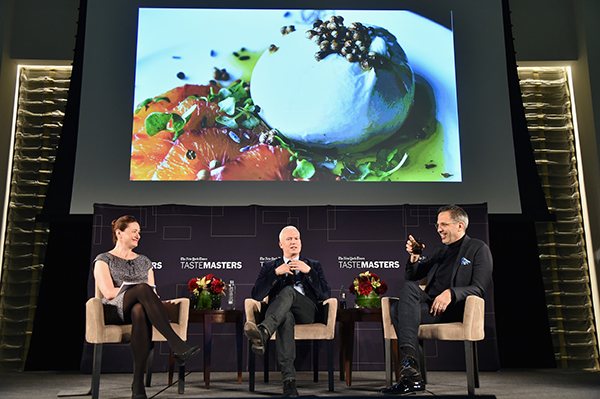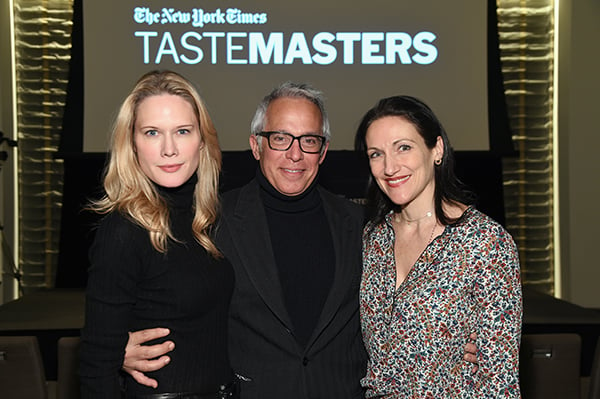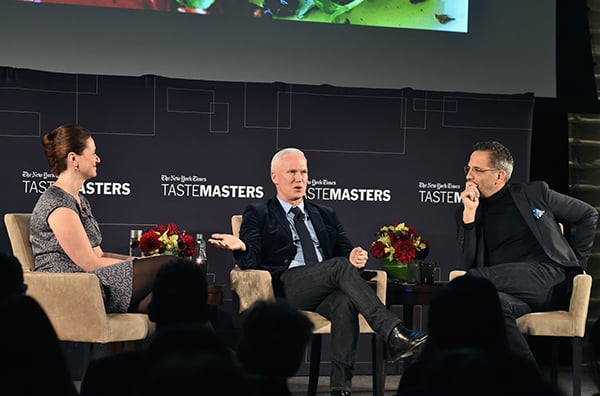People
Klaus Biesenbach and Chef Yotam Ottolenghi Spar Over Whether Food Is Art at Park Hyatt
Do people fetishize art as they do food?

Do people fetishize art as they do food?

Sarah Cascone

“[Food] is an art form because we show it in the museum!” Klaus Biesenbach, MoMA PS1‘s director and chief curator, said Monday night to acclaimed chef Yotam Ottolenghi about the museum’s M. Wells restaurant.
Ottolenghi disagreed about food being art. “I work with something that is there to feed people,” said Ottolenghi. “To me, art is something selfless and not about our basic need. Food is a basic need. I’m just a glorified food stylist.” (We wondered where Daniel Boulud might fit in to the equation.)
Biesenbach and Ottolenghi were speaking at the first event in the new TasteMasters series hosted by the New York Times. Both men categorically rejected the description offered by moderator and Times dining reporter Julia Moskin. Moskin described them both as artists, to which Biesenbach objected, noting that he is a curator.
TasteMasters looks to open a dialogue between prominent figures in art, fashion, food, and design, and did illuminate several striking similarities between the food and art worlds, both of which have seemingly become increasingly popular in recent years.
Interestingly, Biesenbach and Ottolenghi both denounced the tendency toward luxury and excess in their respective fields, even while speaking at New York’s Park Hyatt luxury hotel. (Afterward, Biesenbach quickly ran off to hobnob with Lady Gaga at the Americans for the Arts National Art Awards.)
Billed as a chance to listen to two “cultural luminaries” and sample Ottolenghi’s fare (the night’s menu included quail, celery root with flavored sea salt, and a succulent hanger steak), the conversation attracted a crowd of well-heeled Times subscribers as well as celebrity chef Geoffrey Zakarian and former Law and Order: Special Victims Unit actress Stephanie March (also connected to the food world, through her ex-husband, Food Network’s Bobby Flay).

Stephanie March, chef Geoffrey Zakarian, and Pavia Rosati attend the New York Times TasteMasters at the Park Hyatt.
Photo: Mike Coppola/Getty Images for the New York Times.
The two also bemoaned the increasingly acquisition-driven interest in both art and food—the obsessive need to try every Michelin-starred restaurant, or to travel to every art fair. “There is a certain fetishism about food that I find too much,” said Ottolenghi.
“We need to separate the relevance of the art market and its monetary value,” Biesenbach added. But without the billions of dollars being spent on art worldwide, would the Park Hyatt be interested in what he had to say?
In the past, Biesenbach has made a point of not buying art, but he said that that asceticism could only last so long. After one too many cocktail parties where someone said, “‘Oh, you’re the guy with no objects or art in your apartment!'” Biesenbach said, “I had to change.”
He also had disparaging words for the increasingly popular and controversial museum selfie. Questioning whether it is possible anymore to have an “authentic experience” with a work of art, he said, “I was in front of Starry Night—I didn’t look at it because I was looking at the camera.”

New York Times dining reporter Julia Moskin, curator Klaus Biesenbach, and chef Yotam Ottolenghi speak onstage at the New York Times TasteMasters at the Park Hyatt.
Photo: Mike Coppola/Getty Images for the New York Times.
The situation is not without its silver lining, though: while museums were initially concerned that potential visitors might be content to experience exhibitions through online photographs, the opposite has actually happened. Just as a carefully curated Instagram feed needs that shot of the kale salad du jour, people are inspired to come to the museum and post their own photos of the exhibition on social media.
Moskin and Biesenbach identified another interesting parallel between success in the fine arts and that in the food industry. Where a young artist can be pigeonholed by an early series of work that sells well, a chef can find it difficult to branch out beyond beloved dishes. “You become famous for a style,” Moskin pointed out, “then it becomes a tyranny.”
Biesenbach also paid lip service to MoMA PS1’s recently-announced year-long free admission policy for New Yorkers. In “a city that is getting so expensive,” he said proudly, calling out the nearby mega high rise at One 57th Street), and said that introducing such a policy is “disruptive.”
When asked whether commercial, celebrity-driven initiatives such as big-name chefs shilling for the likes of Coca-Cola or the much-maligned Björk exhibition at the Museum of Modern Art, Biesenbach delivered an evasive, rambling non-answer, referencing Joseph Beuys and Andy Warhol, who was “in the public eye doing commercials.”
TasteMasters will continue on November 23 at the Park Hyatt in Paris with Sarah Lerfel Andelaman of Colette, a Parisian boutique, and gallerist Emmanuel Perrotin.